You’ve heard of Kruger and Dunning’s famous Effect, right? Wherein people who are really bad at something think they’re real hotshots? In fact, let’s ask the internet for some graphical aid:
And this isn’t just some internet nobody’s conception of human behaviour – they’re all citing Kruger & Dunning (1999) (but usually less explicitly). Well, since we know the source, let’s find a copy of the original data just for completeness’s sake.
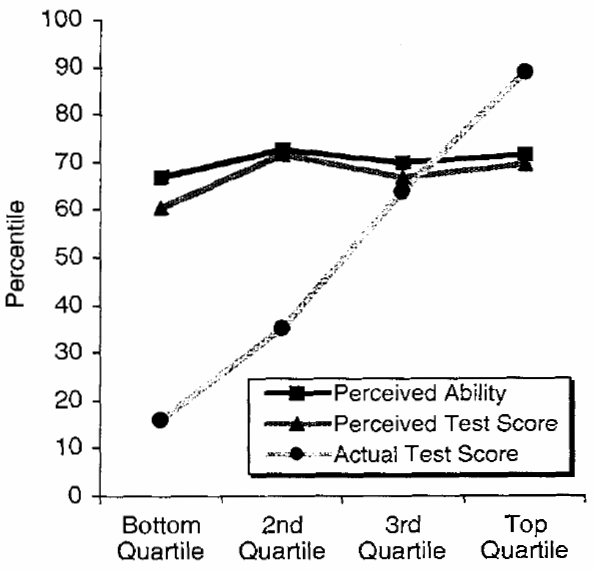
Hm. That’s… quite different. There’s no trough at all, just a mostly-steady line (two of the four studies had an upwards incline, but all together it’s not enough to make such clear inferences).
This lays the basis of what I shall refer to as the “meta-Dunning-Kruger effect”:
people who know the least about the experimentation and results of Kruger and Dunning are disproportionately inclined to make authoritative claims about it.
(while looking for the sample images above, I found this post which laments the exact same trend. Dammit, ninja’d!)
So first of all, what is the actual trend described by the eponymous Effect? Well I would implore you to read the actual paper, Unskilled and Unaware of It: How Difficulties in Recognizing One’s Own Incompetence Lead to Inflated Self-Assessments, because it’s quite interesting on its own and this way you’re surest not to fall victim to the meta-Dunning-Kruger effect yourself. But you’re a busy person so I’ll summarise it thusly:
people who perform poorly at a task tend to rank themselves significantly higher than their actual position, and those who are most competent tend to rank themselves lower.
Emphasis on “rank” is not undue: the people who do worst do not (necessarily) believe themselves to be exceptionally good; they just think they’re better than most others. And notably, those at the absolute top are not “enlightened” of their true ability – they still think a quarter of people would do better (this is called impostor syndrome).
But the most notable thing is that there is no recorded “Valley of Despair” – participants’ perceived performances are instead remarkably consistent across all abilities, and I think this is a far more fascinating insight into human cognitive biases (as well as being backed by actual experimental data). So those at the bottom are aware of things they don’t know, but still think whatever they do have is enough to give them an edge over the others they imagine don’t have that slight ability.
What’s impressive is just how pervasive this “Valley of Despair” is. That it and a “Mount Stupid” are given the same name every time shows how often “people these days” will quickly copy something they saw on the internet with no independent effort of their own.
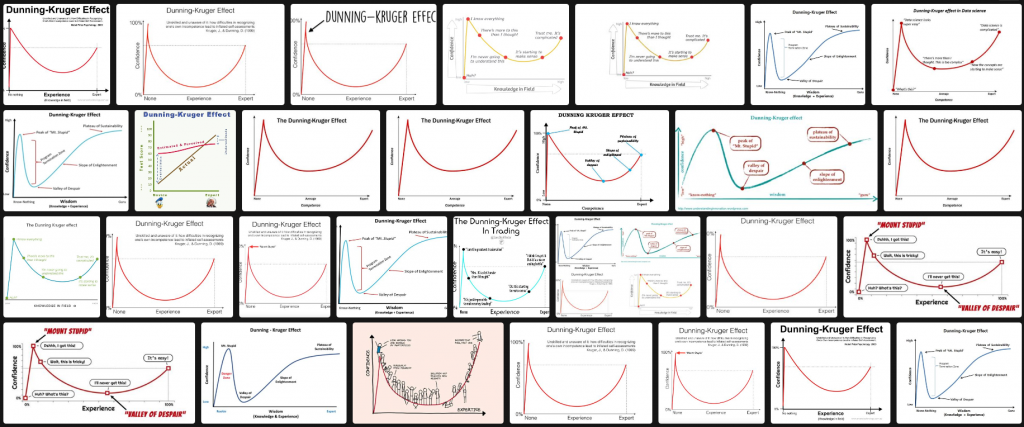
I suspect this trend of “Mount Stupid” was instigated by SMBC comics, but it’s worth noting that that is a comic making a joke which itself makes zero reference to the work of Kruger & Dunning. So he gets a begrudging pass, but everyone blindly labelling that “Dunning-Kruger” still fails. Seriously, some images actually cite the paper by its title and even by the date and journal of publication but apparently didn’t bother to actually, you know, check what they were citing. (the first example image up the top claims they won a “Nobel Prize Psychology” – an award that has never existed. Details, details; the prestigious Nobel Prize and that comedic Ig Nobel Prize are similar enough.)
What genuinely sucks about the work of Kruger & Dunning as purported by its perennial proponents is how it is used as a quick’n’easy dismissal of genuine expertise: “oh my, you’re mighty sure about this aren’t you? Clearly you know absolutely nothing and I, recognising my faults, am the actual knowledgeable one here.” Just one more example of anti-intellectualism to add to the list.
The meta-Dunning-Kruger effect really is quite ironic and describes itself well: as those advocating the Dunning-Kruger effect would eagerly tell you, knowing just the name of something would make someone extremely confident about the details of what it represents.
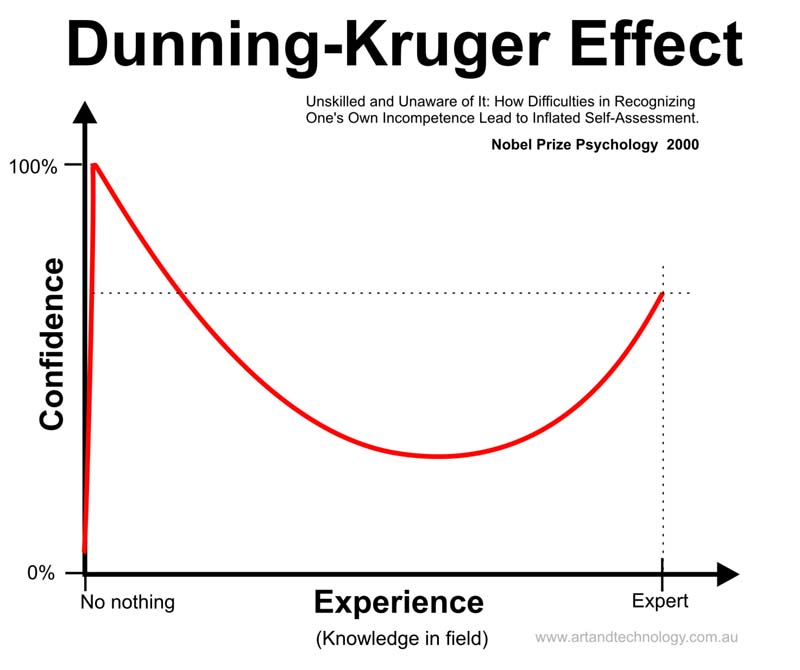
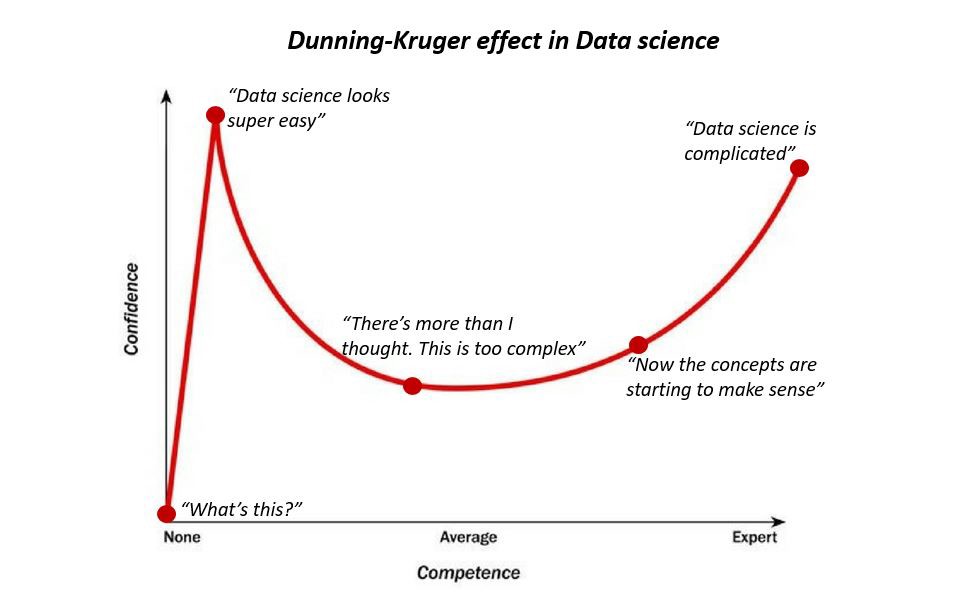
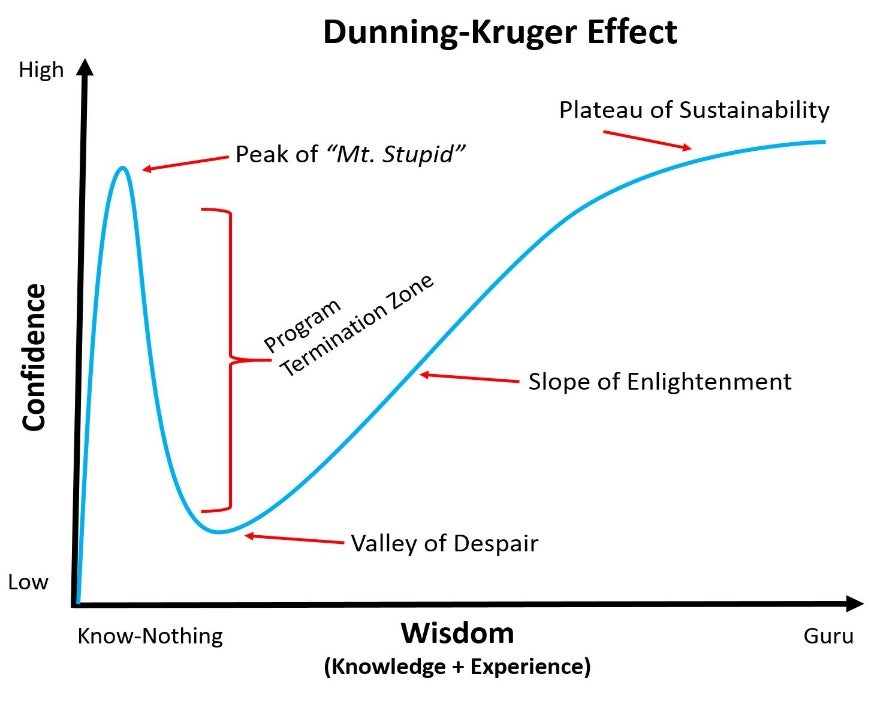
James Charbonneau says:
March 4, 2021
Hey,
The “valley of despair” actually shows up in a lot of subsequent Dunning Krueger data when they move away from binning. For instance, this paper that has does 4 independent tests to confirm the DK effect:
https://www.semanticscholar.org/paper/The-hobgoblin-of-consistency%3A-algorithmic-judgment-Williams-Dunning/7158bddb3c19f77e4cf71ffb8bc22f7ff005c2aa
There are reasons to be suspicious of the DK effect, but I don’t think this is one of them.
cheers,
james
kazitor says:
March 5, 2021
Thanks for the pointer to more recent research (and without the paywall, too). It’s definitely worthwhile to see.
I think you might have misunderstood the purpose this post, though – I have no qualms with the DK effect itself, but the way a certain distortion of it has gained such pervasive prominence without anyone checking the research they are ostensibly citing, and subsequently abused to perpetuate a sort of pseudo-intellectual superiority. I haven’t given that paper a thorough read yet, but the results don’t appear to corroborate the peak of “Mount Stupid”, for instance.
Certainly interesting to see there is evidence of a (far less pronounced) “valley”, though. Thanks again for the link! It’s been added to the reading pile.